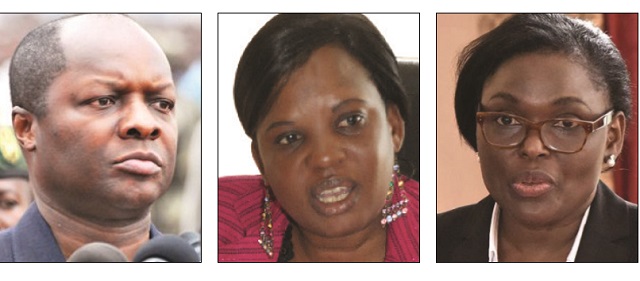
Amongi recently told a group of civil society from Uganda and Tanzania at a conference held in Entebbe on the East Africa Crude Oil Pipeline that she had been tasked by the government to find land for the pipeline by the middle of 2018.
In order to promptly find this land, Amongi said, her ministry has been working frantically on modalities to guide her to ensure that that land is acquired by the set deadline. Among those modalities is an enabling law, she said.
She said in just two financial years, 2016/17 and 2017/18, 50 big infrastructure projects have stalled and cost the government Shs 350 billion but she did not list them all.
Among the only “selfish and greedy” persons Museveni named was one Charles Kahirwa of Ntungamo district in south western Uganda who demanded for Shs.1.2 billion for one acre of land as compensation during the planned building of an electricity transmission line.
Museveni said if Kahirwa’s claim had been paid, the taxpayer would be compelled to pay Shs. 787 billion in that power project. That money, the president said, is enough to extend the power grid to all the Sub- Counties in the country that have no electricity supply yet.
While commissioning the Kamwenge—Fort Portal road on Sept. 7, Museveni noted that the road works got stalled when another man called Kasangwa wanted a billion shillings for a quarter an acre yet the piece of land had been valued at Shs 89 million. The contractor eventually changed the course of the road.
Interestingly, Museveni said that during the survey for the Mpigi-Kanoni-Kabulasoke-Maddu-Ssemabule–Masaka road, the government acquired 21 acres of his land in Gomba for only Shs 69 million, saying he accepted the money because he knew the road would be of use to him.
Museveni says the government cannot allow this state of affairs to continue and in order to end these delays, the amendment says the government will deposit compensation money, as assessed and arrived at by the Government Valuer—in a Court where the property owner can access it even as they pursue their claim for money.
“Those who are rising in arms against the amendment are mere thieves, corrupt, enemies of Uganda who are just frustrating government programmes and must be exposed,” he said, while speaking on Voice of Tooro in Fort Portal on Sept.6.
“These are greedy parasites that are paralyzing government programmes by demanding exorbitant compensations,” he said.
Museveni said if the 68% of the Ugandan population that is said to be engaged in subsistence farming is to join the monetary economy; the government has to build roads, the railway and supply electricity to create more employment opportunities.
But Museveni’s opponents argue that if land is acquired before compensation, the owner may not get proportionate payment from the government. Buganda’s King Ronald Muwenda Mutebi recently said the proposed Constitution amendment is a “pain” as it threatens the existence of future generations. Mutebi who is one of the biggest land owners in the country said details of the bill are still hazy for him.
Mutebi reiterated his stance on the bill while opening the 25th Buganda Lukiiko at Bulange-Mengo saying that infrastructure development on private land should only take off after agreement between the government and land owners.
Owor says it is unfortunate that Uganda has had land laws which are being implemented at only 10% yet if these same laws were to be implemented at say, 50%, “Ugandans would not be hearing the noises they are hearing now.”
Among the slew of legal documents that must be considered during any compensation are the Uganda Constitution (1995), the Local Government Act 1997, the Land Act, 1998, the Physical Planning Act, 2010, the Valuation Act 1965, the Access to Roads Act (1996), the Land Acquisition Act (1965), the Land Regulation Act (2004), the Land Act (Amendment) (2010) and more. Different departments also have internal Land Acquisition Manuals (LAMs). So it is unclear what point Museveni hopes to score with the controversial amendment he is peddling.
So Owor says if the president has no other motives for Uganda’s land he should wait for the views of Ugandans and for the Lady Justice Catherine Bamugemereire’s Land Inquiry to finish its work.
“A commission of Inquiry on Land is going on and even if the country has so far been shocked by the obscenities unearthed so far, that is just the tip of the iceberg,” he says, “There is simply too much rot in the land sector.”
Meanwhile, the Inter-Religious Council of Uganda has also intervened in the current debate saying there is need for a referendum before any amendment of Article 102 (b) of the Constitution that seeks to lift the age limit is done.
Speaking at a press conference on Sept.18 in Kampala, the religious leaders said the age limit debate is an issue which is beyond partisan politics and citizens with contrary views must be listened to before any amendments are considered.
****
 The Independent Uganda: You get the Truth we Pay the Price
The Independent Uganda: You get the Truth we Pay the Price




Good work done. Thanks